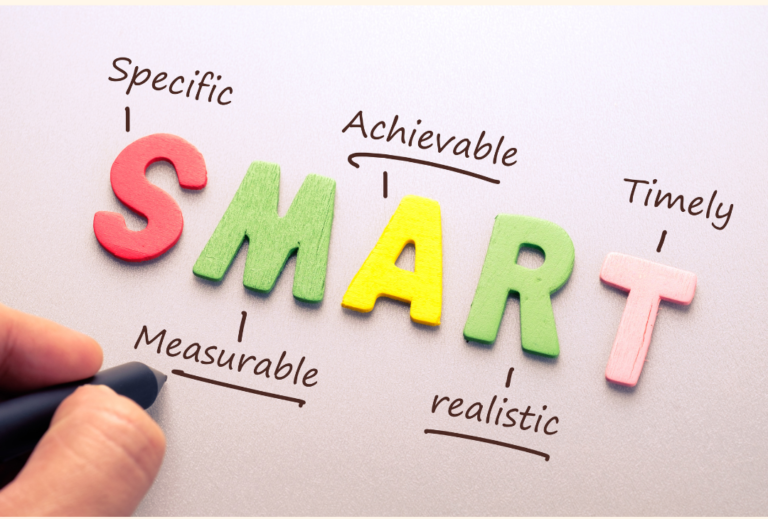SMART Goals and Professional Success
” Why bother setting goals when the world is unpredictable? ” – Client
” I’ve lost every New Year’s Resolution I’ve set for myself. ” – Client
They aren’t wrong – I’ve been successful in keeping zero New Year’s Resolutions, and felt frustrated in the ever-changing world and my goals.
If you’ve thought similarly, you aren’t alone. Most people think setting goals is a waste of time. Yet, I’m writing about SMART Goals setting and Professional Success. Why?
That’s because I have the answer and it’s simpler than you might imagine and harder to put in practice. Simply, we have a poor relationship with goal setting.
Think about the last time you set a goal, a SMART goal, or a plan. What was your focus?
For most, the focus is on the desired outcome of the goal, ie Result.
This is where we go wrong. We spend too much focus “goal setting = results”, and not “goal setting = measuring effort”.
What is Goal Setting?
Goal setting is a benchmark to help us realize if our effort are on track, if our priorities have shifted, or if our distractions are costing us too much.
Let’s break it down a bit more. . .
If we’re setting goals to measure effort, something within our control, we can focus on it at any interval of our choosing. We can say, I’ve published 2 blogs this week, I’ve submitted 5 resumes today, I’ve mentored 2 colleagues this week, I sat down and pondered about life for 3 hours, etc.
All of which are within our locus of control and mostly within our locus of influence.
By measuring your hours, deliverables, people, etc. you’re able to quantify your effort and know that if you continue there is a higher likelihood of success. Effort is more important than result.
Yet, sometimes we can get distracted from our goals. We can feel less motivated, exhausted, or having such a great time on vacation that we forget to work on our goals. This is also okay, because when we focus on effort and not results we can pick it back up when we’re ready.

Why is goal setting Important?
People who set specific goals are 10 times more likely to succeed than those who don’t. (HBR)
If you want to focus on your career plan and professional development, you’re more likely to accomplish your goals if you set specific goals and focus on the effort that’ll help you achieve your goals.
Yet, many of us aren’t the best as setting specific goals, we set half-hearted goals.
“Getting a leadership role”
“Learn time-management”
“Be a strategic planner”
These are aspirational statements and not goals, but most of us believe that’s a goal, myself included. Thus grew the notion of this post, SMART Goals.
What are SMART Goals?
SMART goal is a methodical way of helping your create clear, actionable, and realistic goals that’re measured by effort at a regular interval. SMART is an acronym that stands for Specific, Measurable, Achievable, Relevant, and Time-bound (or Timely).
Specific: Define Your Goal with Precision
Start by asking yourself, “What do I really want?”
Maybe it’s a promotion, a new skill, or even a career change. A specific goal is clear and unambiguous.
Instead of saying “I want get a leadership role,” why not say “I want to network in leadership spaces, and demonstrate my leadership skills in my current projects by the end of this year”?
Specific goals leave no room for confusion and give you a clear direction.
Have you thought about what exactly you want to achieve?
Measurable: Track Your Progress
Determine how you’ll track your progress. Think about setting criteria that allow you to track your progress.
For instance, if your goal is to learn time-management, you might want to start with reflecting on your past on specific activities that drain your time, as a benchmark, and then focusing on it weekly, monthly, quarterly, with the goal of reducing the time drain by 5% every instance.
Consider using tools like spreadsheets or apps to visualize your achievements. Or your calendar’s built-in AI tool that can provide insights into how much time was used for a particular activity.
Celebrate the measurable process, it won’t be a linear progress but track your effort you’ll notice your trend towards your goal.
Achievable: Ensure It’s Within Reach
Under promise and over deliver – you’ve likely heard this phrase, this is also true for goal setting. Don’t put yourself in a position where the goal because too much of a challenge and becomes unattainable, because that will lead to frustration and it’ll easily demotivate you to continue working on the goal with your full intention.
Ensure that your goal is achievable given your current resources and constraints. Do not create a goal with hopeful resources and constraints, this can lead you towards a blame cycle, focus on what is within your locus of control.
Reflect on your current capabilities and the steps needed to reach your target. Is this something you can realistically accomplish?
This is a perfect place to recognize and honor your BIG goals, while creating smaller SMART goals to help you manage the goal and provide a smaller, more impactful and measurable, steps towards accomplishing your goal.

Relevant: Align with Your Values and Needs
Your goals should matter to you and align with other relevant goals. A relevant goal will keep you motivated and driven. Does your goal align with your long-term objectives?
This is a compass, making you aware that you’re still aligned with your ultimate goal or if this goal is a distraction.
Warren Buffett, is created with creating the “5/25 rule”.
Create a list of 25 strategy goals, then circle the top five and avoid the other 20 at any cost.
The other 20 goals becomes a healthy distraction where you think you’re working towards your goal, but you’re actually using your resources to work towards something that isn’t as meaningful to you as the top 5 goals.
Reflect on why this goal matters to you. Is it aligned with your long-term vision? Ensure your goal resonates with your personal and professional values.
This relevance keeps you motivated when the going gets tough.
Time-bound (Timely): Set a Deadline
All great things must come to an end. Also, all horrible, tough, don’t want to do, things must also come to to an end.
Having a deadline, or a timely check-in, can create a level of urgency and prevent procrastination, and hold us accountable. Are we really meeting the measurable tasks we set out by our deadline?
By setting a time frame, you encourage yourself to take action.
For example, if you want to become a strategic planner, you need to set your goals specifically, have a measurable component/s, make sure you have the correct resources, and it aligns with your bigger goal, and then it meets a deadline.
That SMART goal may sound like, “I want to become a strategic planner for my projects where I need to collaborate with different departments. I will hold a weekly strategic planning session with one other department/colleague to understand the hurdles and resources within my scope. By continuously focusing on building a strategy for my projects, this will give me the opportunity to learn about the strategy process, I will take one training this month to help build the knowledge gap, and continue focusing on my weekly strategy sessions with at least one different department for the next six months, and revisit my professional development plan with my manager to continue developing my skills in strategic planning.”
That is a SMART goal where the Specific is detailed as becoming a strategic planner, it’s Measurable because the session will be held weekly (Timely), it’s Achievable because it’s focused on their own project, it’s Relevant because it’s a project for work and builds on the six month Timeline which is geared towards developing strategic planning skills.

Getting Started with SMART Goals
The first few SMART goal attempts can be tough, but it’s helpful to reflect on the questions posted above. Work through all the acronyms, even it feels like it doesn’t align, spend time thinking about how you can make it more concrete and grounded.
Start with a goal you’ve been thinking about and apply the SMART criteria.
Write it down, break it into small actionable steps, and watch as you progress.
Remember, the journey of a thousand miles begins with a single step.
Final Thoughts
Setting goals is a tool to help you in your professional development. Like any tool, it’s only useful if you know how it’s used and what it can do to help you.
When you set detailed goals, don’t just put it back in a notebook/drawer/computer, share your goal, ask for feedback, ask for support, ask more criticisms (from trusted parties). Looking at your goals on a regular basis helps you keep them at the top of your mind and allows you to be more intentional on how you use your time and energy.
Set your SMART goals and see how much you can accomplish in a short time.
